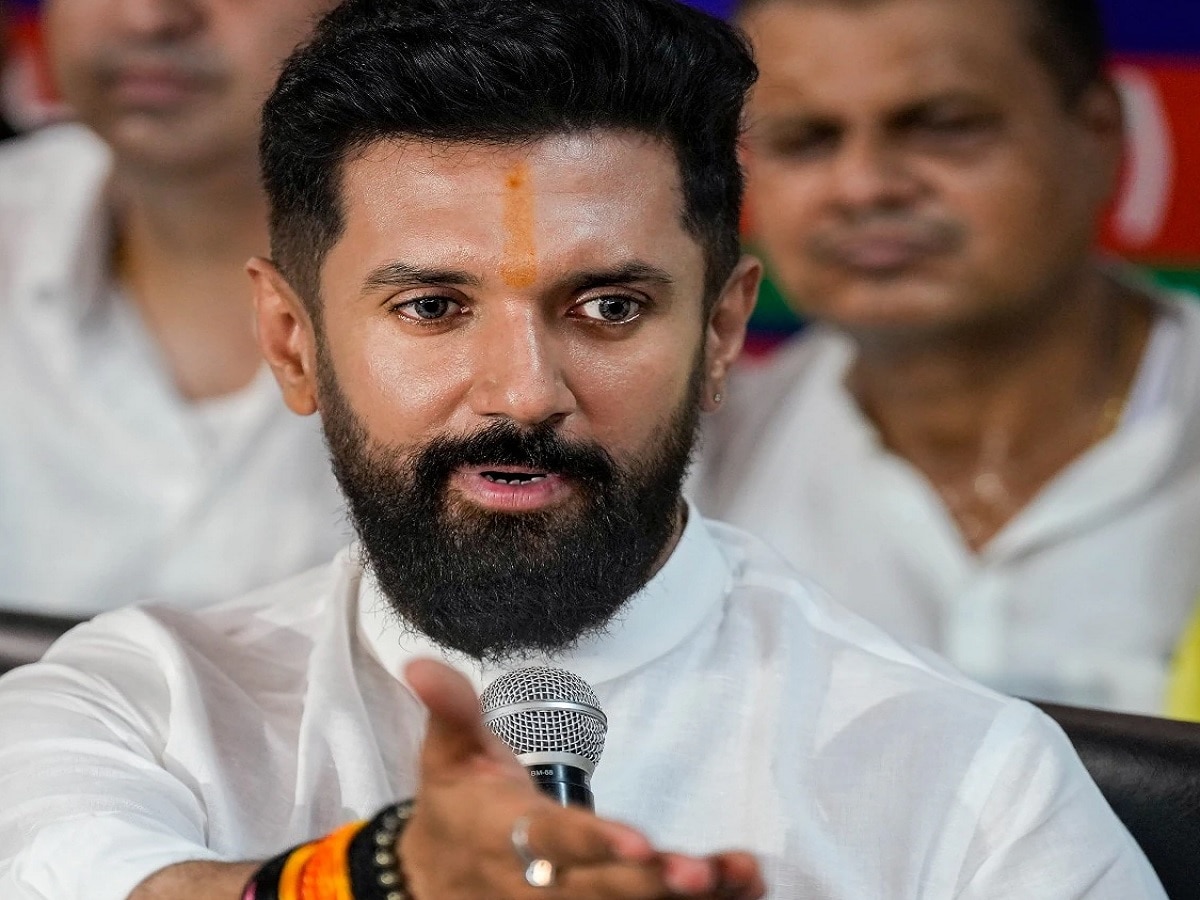


Chirag Paswan, the Union food processing minister and Lok Janshakti Party-Ram Vilas, stated that his party will be participating in the upcoming assembly election in Jharkhand. He met with Home Minister Amit Shah to discuss the political situation and the elections in Jharkhand. Paswan expressed his support for fighting the elections under the National Democratic Alliance, with a final decision to be made in the next 2-4 days. The state unit of the party is keen on joining the contest.
Chirag Paswan's Political Moves and the Looming Jharkhand Elections
Chirag Paswan, the Union Minister of Food Processing Industries and the leader of the Lok Janshakti Party (Ram Vilas), has recently made waves in the political arena. His latest move to participate in the upcoming Jharkhand Assembly elections has raised eyebrows and sparked discussions about the future of his party.
Background:
The Lok Janshakti Party (LJP) is a political party founded by Chirag Paswan's late father, Ram Vilas Paswan. The party has traditionally been an ally of the Bharatiya Janata Party (BJP) and has held several positions in the NDA government at the Centre.
However, in recent years, Chirag Paswan has taken a more independent stance, often criticizing the BJP's policies. He has also distanced himself from the NDA in several states, including Bihar.
Current Developments:
Chirag Paswan's announcement that the LJP will contest the Jharkhand Assembly elections has surprised many. The party has not had a strong presence in the state in the past and faces an uphill battle against the incumbent BJP-led government.
Paswan met with Home Minister Amit Shah to discuss the political situation in Jharkhand. He expressed his support for fighting the elections under the NDA, but a final decision has yet to be taken.
The state unit of the LJP is reportedly keen on contesting the elections, seeing it as an opportunity to expand the party's base in eastern India. However, the BJP is unlikely to welcome the LJP's participation, as it could split the NDA vote in the state.
Top 5 FAQs:
Q1: Why is Chirag Paswan contesting the Jharkhand Assembly elections? A1: Paswan has stated that he wants to expand the LJP's presence in eastern India and believes that participating in the Jharkhand elections is a step towards achieving that goal.
Q2: Will the LJP contest the elections under the NDA banner? A2: A final decision has yet to be taken. Paswan has expressed support for an NDA alliance, but the BJP is reportedly reluctant to include the LJP.
Q3: What are the chances of the LJP winning seats in Jharkhand? A3: The LJP has not had a strong presence in Jharkhand in the past, but it could potentially win a few seats if it manages to form an alliance with a larger party.
Q4: What impact could the LJP's participation have on the BJP's chances in Jharkhand? A4: If the LJP contests the elections separately from the NDA, it could split the NDA vote and weaken the BJP's chances of retaining power.
Q5: What are the LJP's key campaign issues in Jharkhand? A5: The LJP has not yet released a detailed manifesto for the Jharkhand elections, but it is likely to focus on issues such as unemployment, poverty, and agricultural distress.

In honor of World Polio Day, local restaurants in Minnesota are teaming up for the "End Polio Now" event to raise awareness and funds for polio eradication. From 7 a.m. to 7 p.m., residents are encouraged to dine at participating restaurants where volunteers will educate them on the impact of polio worldwide and how to help. The event's signature sponsor, Eagle Rock, along with other local restaurants, will donate proceeds to Rotary International, which uses funds to provide polio vaccines to children in vulnerable areas. This effort is crucial given that polio continues to be a problem in some parts of the world, even though it has been eliminated in the US since 1979.

In a tightly contested race for the Rajya Sabha seats in Jammu & Kashmir, the ruling NC alliance emerged victorious, securing three out of the four seats. The BJP, which held only 28 seats in the Assembly, had hoped for a win through cross-voting or support from smaller groups. However, the NC's dominant position in the 88-member Assembly reaffirmed voter trust in their post-Article 370 political stability. PDP President Mehbooba Mufti also congratulated the NC candidates and expressed hope that they will strongly represent the people of Jammu & Kashmir in Parliament.

Mayor Derek Slaughter has vetoed a recent city ordinance that limits the terms of elected officials, citing concerns about retroactivity and lack of language addressing current officials. This veto comes after the ordinance was adopted in a 6-0 vote by City Council, with the mayor absent. If legally challenged, the defense of this ordinance could result in unnecessary costs for taxpayers. The mayor's decision has sparked a response from council members, with attempts to reach them for comment.

Prime Minister Narendra Modi addressed his first election rally in Bihar and expressed confidence in winning the upcoming polls. He mocked the opposition INDIA bloc and praised the unity within NDA, highlighting leaders like Nitish Kumar, Chirag Paswan, Jitan Ram Manjhi, and Upendra Kushwaha. Modi also criticized the 'jungle raj' under RJD and Congress and highlighted Bihar's progress under Nitish Kumar's tenure. Despite the upcoming Chhath festival, the PM thanked the crowd for attending and described the recent GST rate revision as a 'festival of savings'.

The suspension of Praveen Kumar K P, a PDO serving in Sirwar taluk of Raichur district, for participating in an RSS rally has sparked controversy in Karnataka. BJP leaders have condemned the move and promised to fight it legally, claiming that the officer's right to participate in such events is protected by law. Meanwhile, the state's Rural Development Minister has written to the Chief Minister for a ban on RSS activities on government premises, further intensifying the issue.

In a heated verbal exchange, Maratha quota activist Manoj Jarange Patil accused NCP Minister Chhagan Bhujbal of attempting to create a rift between the OBC and Maratha communities for political gain. During a recent OBC rally in Beed, Bhujbal and Dhananjay Munde attacked Jarange, with Pankaja Munde, a BJP OBC leader, watching from the sidelines. Jarange also praised Chief Minister Devendra Fadnavis and Minister Pankaja Munde for staying away from the rally and emphasized the unity of the OBC community. Bhujbal, on the other hand, warned Jarange against challenging the community's rights and vowed to stand up against any attempts to divide them.

On the auspicious occasion of Bhai Dooj, Madhya Pradesh Chief Minister Mohan Yadav transferred a total of 44,900 crore directly into the bank accounts of 1.27 crore women beneficiaries under the Ladli Bahna Yojana. This initiative aims to support and empower women in the state, with each eligible woman set to receive 1,500 per month from November onwards. During the special program at the Chief Minister's residence, Yadav extended his wishes for a happy Bhai Dooj, emphasizing the importance of the brother-sister relationship and the government's commitment towards ensuring the safety and well-being of Ladli Bahnas in the state.

Union Home Minister Amit Shah celebrated the Gujarati New Year and his 62nd birthday in his hometown of Ahmedabad, surrounded by senior political leaders, party members, and well-wishers. Shah's rise in public life through the RSS and his partnership with Prime Minister Narendra Modi have shaped Gujarat's and India's political narrative. His sharp organisational mind, efficient approach, and booth-level political management have been key in building the "Gujarat model" that gave the BJP an enduring edge. Despite transitioning to national politics, Shah's political heart still beats in Ahmedabad, as evident in his New Year celebrations and plans to meet the newly appointed ministers of the Gujarat cabinet.

In a recent incident at the Vasai Fort in Maharashtra, a man dressed as Chhatrapati Shivaji Maharaj got into a heated argument with a security guard over language. The man, who was recording a video, berated the guard for not speaking Marathi and disrespecting the legacy of Shivaji Maharaj. Social media users were divided in their opinions, with some criticizing the man's behavior while others felt the guard needed to be taught a lesson.

In a significant moment for gender equality, President Droupadi Murmu became the first woman to visit the Lord Ayyappa Temple in Sabarimala. Accompanied by her team, she performed Darshan and Puja at the shrine, praying for the well-being and prosperity of her fellow citizens. Her visit symbolized the Supreme Court's decision to lift the ban on menstruating women entering the temple, reminding us that devotion knows no gender barriers.